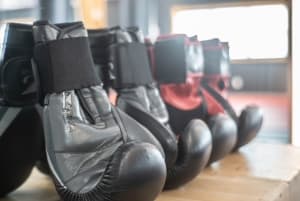
Boxing for Self Defense: How the sweet science can save you in the real world
When people think of boxing, they often imagine a brightly lit ring, roaring crowds, and professional fighters exchanging blows for titles and glory. Beyond the glitz of prize fights, boxing offers something immensely practical: a powerful tool for self defense in real world situations.
Why boxing works in self defense:
boxing is more than just throwing punches. It is about timing, precision, footwork, and awareness - skills that translate effectively when personal safety is on the line. This is what makes it an essential part of a well rounded self defense training regiment.
Here is why boxing is effective in self defense:
1.) Situational awareness and footwork.
Good boxers are always learning how to read their opponents as well as there surroundings. In self defense, awareness is one of your most critical assets. Boxing teaches you to stay alert, focused under pressure, recognizing threats early, and how to position yourself in a way that give you the advantage or and escape.
Footwork, often overlooked, is vital. A great stance and knowing how to move properly can help you evade attacks, keep your balance, and avoid getting cornered or trapped.
2.) Quick, effective strikes.
Boxing focuses on a small number of highly efficient strikes: the jab, cross, hook, and uppercut. These punches, when properly trained are powerful, fast, and over time become instinctive. In a self defense situation, you don't have time for fancy moves. You need to act quickly and decisively - something boxing trains you to do.
3.) Defense and damage mitigation.
Defense in boxing isn't just about blocking - its about slipping, bobbing, and using your hands to deflect or neutralize incoming attacks. If a confrontation becomes unavoidable, knowing how to protect your head and vital areas can reduce the chance of serious injury.
4.) Building confidence under pressure.
Boxing trains you to remain calm under stress and gives you the ability to think and make better choices. The more you get used to pressure, the less likely you are to freeze or panic during a real life confrontation. Confidence, not aggression, is often the deciding factor in whether or not a situation escalates.
5.) Physical fitness and conditioning.
Lets not forget the physical benefits for your overall health. As the saying goes - "You do not need to be in shape in order to defend yourself... but it helps". Along with the self defense aspect of training, boxing provides its athletes with strong cardiovascular health, faster reflexes (important as we all age), and muscular endurance. This conditioning part of training can often be the difference between getting away or being overwhelmed.
What boxing doesn't cover:
It is always concerning to me when I hear a person who only trains in one style of fighting that their style is "the best". It's important to acknowledge that not one style covers everything and they all have their limitations, boxing included. Because of its competitive nature, boxing doesn't deal with grabs, throws, kicks, chokes, weapon threats, groundwork, or multiple threats. For a complete self defense regiment, it is wise to combine boxing with other systems, or at the very least, develop an understanding of how to handle situations where striking alone is not enough.
Leaving thoughts:
If you're looking for a practical, accessible, and proven method of defending yourself, boxing is an excellent place to start. It sharpens your reflexes, builds mental toughness, and gives you the tools to protect yourself and your loved ones.
Train hard. Train safe. Train smart. Stay sharp. And remember, the best fight is the one you never have to fight!

